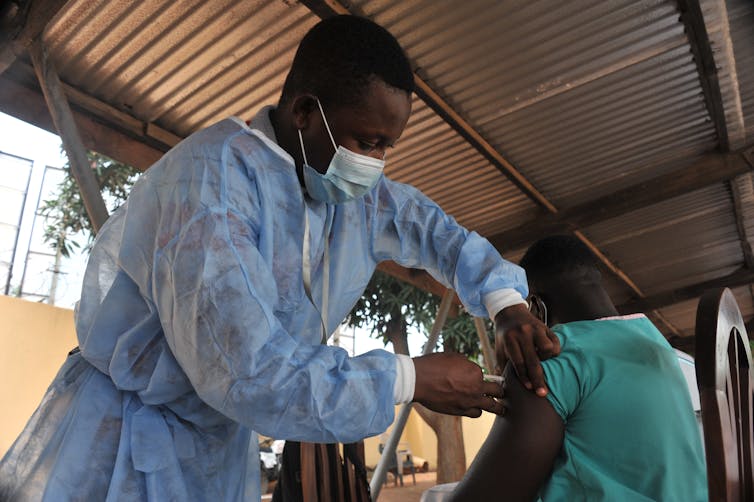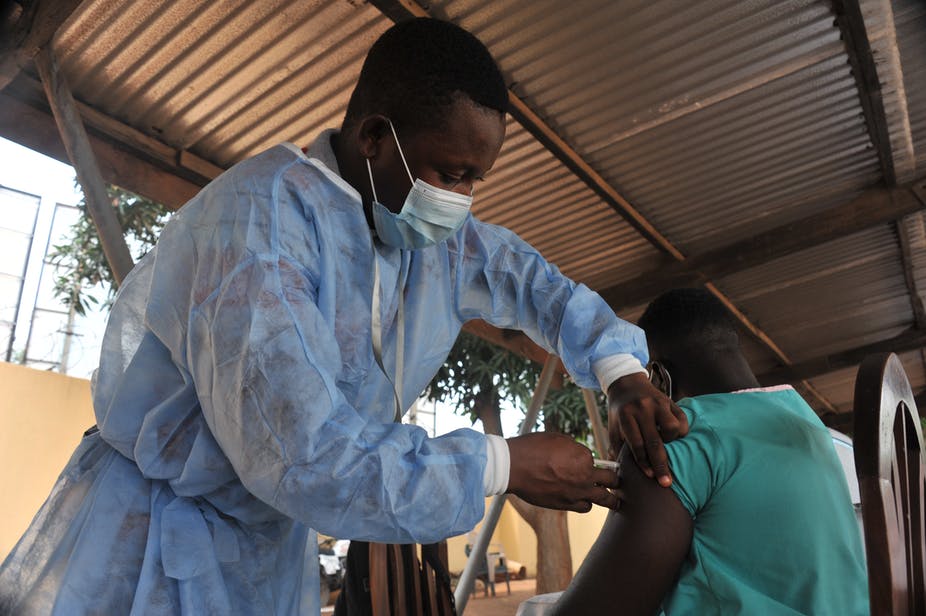
Seth/Xinhua via Getty
Patience Afulani, University of California, San Francisco
Stress and burnout among healthcare workers is a global crisis that predates the COVID-19 pandemic. Studies done before the pandemic showed that many healthcare workers around the world were experiencing high levels of stress and burnout. But the pandemic has exacerbated this – particularly in low resource settings.
We know that high stress and burnout lead to decreased job satisfaction and commitment, lower productivity and effectiveness, and poor quality of care, with risks to staff and patient safety. Stress and burnout are also associated with depression, cardiovascular disease and premature mortality, potentially putting healthcare providers at greater risk of COVID-19 infection.
Provider burnout is expensive for the health system given its associations with poor quality of care, absenteeism, and high workforce turnover. It is, therefore, important to address the high stress and burnout among healthcare providers – particularly during this pandemic.
We conducted surveys at the beginning of the COVID-19 pandemic (April and May of 2020) among Ghanaian healthcare workers. We wanted to assess their levels of stress and burnout and which factors contributed to them. In particular, we looked at whether healthcare workers’ perceived level of preparedness for the pandemic was associated with their stress and burnout levels.
We found high levels of stress and burnout among healthcare workers, which was associated with low perceived preparedness. The combined effects of low preparedness and high stress and burnout could have catastrophic effects for the already overburdened healthcare system in Ghana. One of these effects could be an increase in illness and death from COVID-19.
Ghana’s overburdened health system
Ghana has a constrained health system, with a population of about 30 million, and an estimated 1.1 medical doctors and 27.1 nurses and midwives per 10,000 population. There is less than one hospital bed per 1,000 people.
The increasing number of patients with COVID-19 has therefore been a major source of concern for healthcare workers. In addition, healthcare workers expressed to the media fear of coronavirus infection due to concerns about inadequate testing, personal protective equipment and isolation wards. This even sparked threats of industrial action by nurses and doctors in Ghana.
By mid-April 2021, Ghana had recorded over 91,000 confirmed cases of COVID-19 and 766 deaths. As of July 2020, over 2,000 healthcare workers in Ghana had been infected with the coronavirus, and there had been 6 confirmed deaths of healthcare workers in Ghana due to COVID-19. These numbers continue to increase based on various facility data, although official figures for the country have not been released.
Read more:
How leadership matters in healthcare – especially in a crisis
We conducted a cross-sectional online survey with healthcare workers, involving recruitment from social media groups of various healthcare workers in Ghana.
Stress and burnout were measured by established validated tools. Stress was measured using the 10-item Cohen perceived stress scale, which captures people’s feelings and thoughts on how nervous, stressed, unpredictable, uncontrollable, and overloaded they found their lives in the past month.
Burnout was measured using the 14-item Shirom-Melamed Burnout measure, which assesses feelings at work in the past month related to physical fatigue, emotional exhaustion, and cognitive weariness.
Many healthcare workers in Ghana were experiencing high levels of stress and burnout, we found. About 7 out of 10 healthcare workers were experiencing moderate or severe stress (68%) and burnout (67%). Lack of preparedness was a key factor contributing to the high stress and burnout. Troublingly, less than a third (28%) of the providers felt prepared for the pandemic.
We also found that lack of preparedness increased fear of getting infected, which, in turn, led to increased stress and burnout. Close to half (46%) of healthcare workers were fearful of contracting COVID-19; only 20% were confident that they would be adequately cared for in their facility if they got infected.
On the other hand, providers who felt supported and appreciated by management at their facility had lower stress and burnout levels. Less than half of our respondents felt appreciated by their management, so there is a lot to be gained from giving attention to this. Similarly, providers who felt their families were supportive of their work had lower stress and burnout levels.
Read more:
Making a hospital space feel psychologically safer helped South African health workers
Recommendations
These surveys were conducted early on in the pandemic. But our analysis comes at a time when COVID-19 cases are again on the rise in Ghana. We see in our data very achievable ways to ensure that the country makes the best use of its healthcare workers during this wave of infection.
For example, providers who underwent training on how to diagnose, isolate, and treat COVID-19 patients felt more prepared, making them less likely to experience burnout.
Similarly, healthcare providers who had necessary resources – including personal protective equipment, protocols, isolation wards – felt more prepared and had lower stress and burnout levels. Thus, providing training and resources will be critical to reducing stress and improving care.
The healthcare workers we surveyed also noted the need for more personal protective equipment and isolation wards, pointing to the same dearth of resources that has plagued even the wealthiest countries.
Certainly, these needs are real, but our research suggests that we can also improve morale (and quality of care) through simple, low-cost training and workforce incentives in the country’s hospitals and clinics.
Even something as simple as ensuring that healthcare workers feel that management appreciate their efforts during this challenging time can help reduce stress and burnout.
Communication from management is also important. Burnout can thus be prevented by clear, consistent communication, introducing some positive workforce incentives and offering stress reduction strategies to healthcare workers.
Families and the broader community also have a role to play. By demonstrating support for family members, friends, and neighbours who work in healthcare, people can help reduce the stress and burnout they are experiencing. This will benefit everyone.![]()
Patience Afulani, Assistant Professor, University of California, San Francisco
This article is republished from The Conversation under a Creative Commons license. Read the original article.


